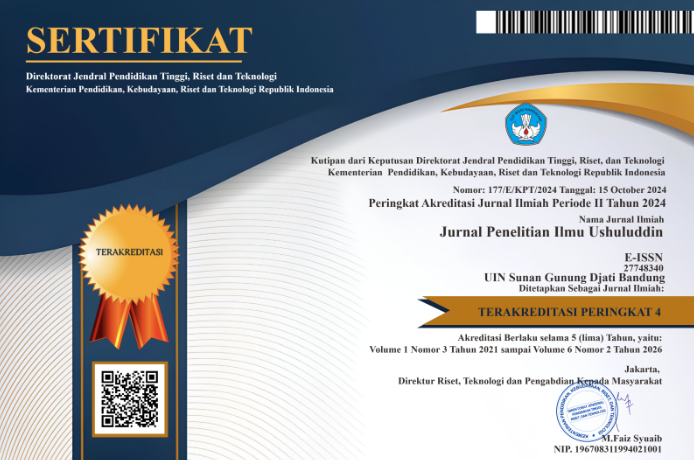Hadis-Hadis tentang Toleransi Beragama dalam Pemahaman dan Pengamalan Siswa SMK Texar Karawang
DOI:
https://doi.org/10.15575/jpiu.15496Keywords:
Practice, Religion, Tolerance, UnderstandingAbstract
Religious harmony should be realized by mutual respect among fellow religious adherents. The reality that occurs in social life is still found in various cases of intolerance. This is a problem that needs to be solved. Understanding of religious teachings and education is needed to foster harmony. Therefore, this paper discusses the Hadith of the Prophet Muhammad SAW related to the teachings of tolerance by analyzing the hadiths that have the same theme. The method used in this research is a descriptive qualitative method using Living Hadith. Tolerance emphasizes the attitude of accepting existing differences and responding well in order to maintain peace among others. Islam is a religion that makes tolerance the most important part, this attitude is more widely applied in social interactions as the Prophet Muhammad SAW has described that the Islam that he spread on earth has educated humans to be able to respect each other among fellow believers without hatred and revenge.
References
Bakar, A. (2016). Konsep toleransi dan kebebasan beragama. Toleransi: Media Ilmiah Komunikasi Umat Beragama, 7(2), 123-131.
Bariyah, M. B. (2019). Ayat Toleransi Dalam Al-qur’an; Tinjauan Tafsir Al-Qurthubi. Al-Mada: Jurnal Agama, Sosial, dan Budaya, 2(2), 31-46.
Casram, C. (2016). Membangun Sikap Toleransi Beragama dalam Masyarakat Plural. Wawasan: Jurnal Ilmiah Agama Dan Sosial Budaya, 1(2), 187-198.
Faisal, A. (2012). Toleransi Beragama Siswa: Studi tentang Pengaruh Kepribadian Siswa, Lingkungan Sekolah dan Prestasi Belajar Pendidikan Agama terhadap Toleransi Beragama Siswa di SMA Negeri 8 Malang (Doctoral dissertation, Universitas Islam Negeri Maulana Malik Ibrahim).
Faozan, T. N. (2020). “Pengertian Toleransi Secara Umum Dan Menurut Para Ahli.â€
Gunawan, H. (2015). Toleransi Beragama Menurut Pandangan Hamka Dan Nurcholish Madjid (Doctoral dissertation, Universitas Muhammadiyah Surakarta).
Guru dan Siswa. (2021).“Hasil Wawancara Di SMK Texar.â€
H.A.R, Tilaar. (2000). “Kebudayan dan Masyarakat Madani di Indonesia.â€
Ihromi, T. O. (Ed.). (1999). Pokok-pokok antropologi budaya. Yayasan Obor Indonesia.
Kartini, R. O., Indrawadi, J., & Fatmariza, I. (2019). Toleransi Dalam Keberagaman di Sekolah Mayoritas Budha. Padang: FIS Universitas Negeri Padang, 2.
Misrah, M. (2010). Kebebasan Beragama Dalam Perspektif Hadis. Miqot, 34(2), 154053.
Mustafa, M. (2015). Toleransi Beragama Dalam Persfektif Al-Qur'an. Tasamuh: Jurnal Studi Islam, 7(1), 1-18.
Rosyidi, M. F. A. A. M. (2019). Konsep Toleransi dalam Islam dan Implementasinya di Masyarakat Indonesia. Madaniyah, 9(2), 277-296.
Setiyawan, A. (2015). Pendidikan Toleransi dalam Hadits Nabi Saw. Jurnal Pendidikan Agama Islam, 12(2), 219-228.
Sutton, M. (2006). Toleransi: Nilai dalam Pelaksanaan Demokrasi. Jurnal Demokrasi, 5(1).
Zed, M. (2004). Metode peneletian kepustakaan. Yayasan Obor Indonesia.
Downloads
Additional Files
Published
Issue
Section
License
Authors who publish in Jurnal Penelitian Ilmu Ushuluddin agree to the following terms:
- Authors retain copyright and grant the journal right of first publication with the work simultaneously licensed under an Attribution-ShareAlike 4.0 International (CC BY-SA 4.0) License that allows others to share the work with an acknowledgment of the work's authorship and initial publication in this journal.
- Authors are able to enter into separate, additional contractual arrangements for the non-exclusive distribution of the journal's published version of the work (e.g., post it to an institutional repository or publish it in a book), with an acknowledgment of its initial publication in this journal.
- Authors are permitted and encouraged to post their work online (e.g., in institutional repositories or on their website) prior to and during the submission process, as it can lead to productive exchanges, as well as earlier and greater citation of published work (See The Effect of Open Access).












